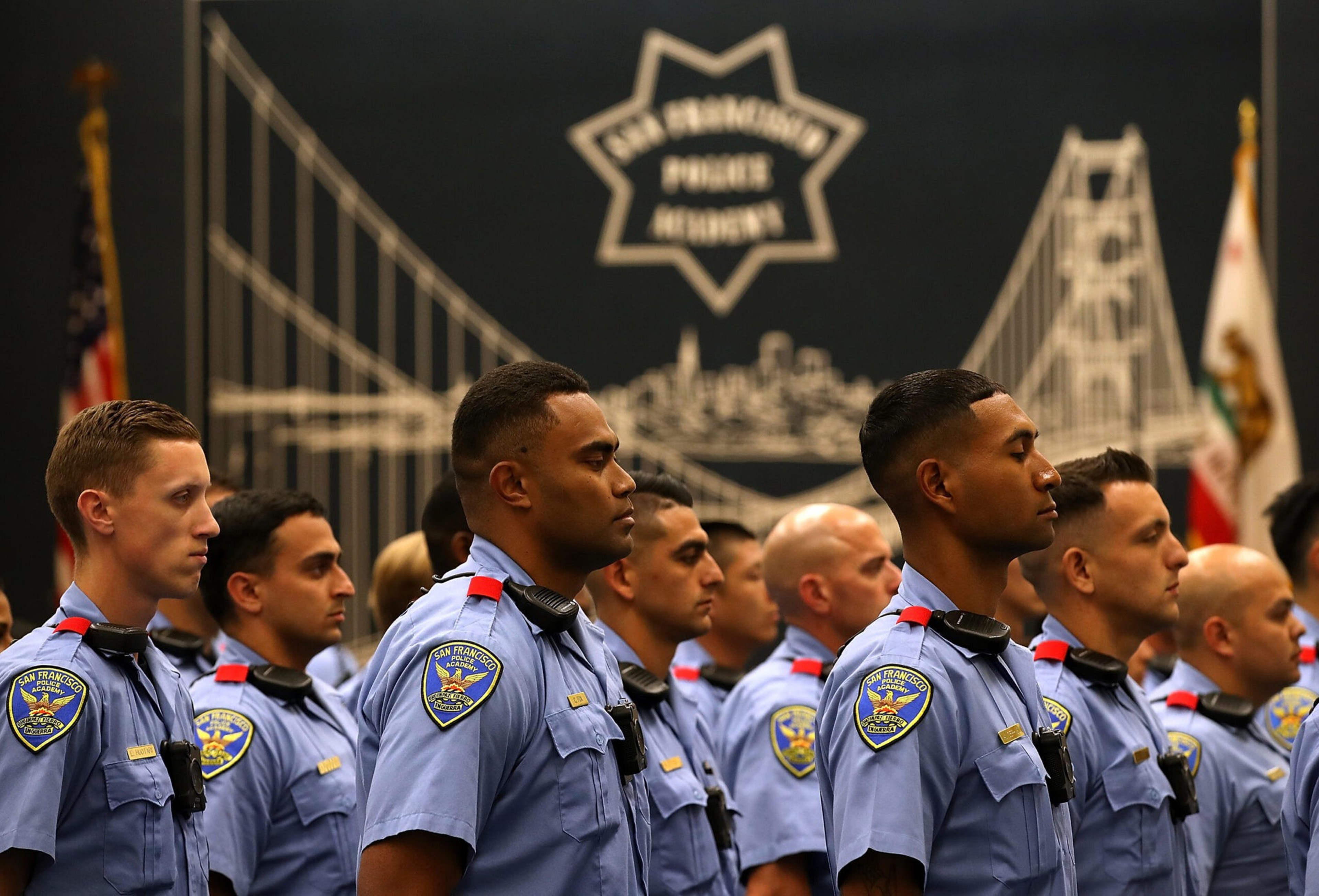The investigators who conduct background checks on recruits to the San Francisco Police Department wield unique power: They make judgments about whether or not an applicant’s past, blemishes and all, deems them worthy of wearing the badge. In that way, these investigators shape the next generation of law enforcement.
But their own backgrounds also bear scrutiny. Three former SFPD officers on the team that conducts background investigations for new recruits have had episodes that should disqualify them from holding that position, critics say. According to public documents and news reports, the investigators’ records include an allegation of domestic violence, leaving a weapon unattended, and shooting a mentally ill woman.
Former officers, a police oversight professional, and a defense attorney say the hiring of individuals with serious red flags in their records represents a breakdown of standards at a position the SFPD has struggled to keep fully staffed in recent years.

One background investigator, Cliff Cook, was arrested in 2005, when he was an officer, for an alleged domestic violence incident. He retired from the force in 2018 and was rehired as a background investigator in March 2019.
Another officer who conducts background investigations, Kimberly Reynolds, shot a mentally ill woman in a high-profile incident in 2005.
A third investigator, Richard Van Koll — who was involved in a physical altercation and is being sued by former employees for unfair labor practices — retired in 2013 and was rehired this year.
The SFPD said in a statement that it stands by its hires.
“We have full confidence in all our employees,” spokesperson Evan Sernoffsky said. “All the people we have hired back as civilian 960s [background checkers] retired honorably.” Sernoffsky said the department subjects all of its investigators to a thorough vetting process that includes a criminal history search.
But when Chief Bill Scott was questioned during a Sept. 4 meeting of the Police Commission about The Standard’s Aug. 27 report on Van Koll, he said that background checks for former officers rehired as 960s are “not as robust as the background checks that we do for people coming into the academy.”
'If the purpose of background investigators is to make sure the new recruits are of the highest ethical quality, then those background investigators have to be of the highest ethical quality.'
John Alden, a former SFPD internal affairs attorney who heads Sonoma County’s police oversight agency
Scott pointed out that certain offenses — such as an arrest that doesn’t lead to prosecution — don’t automatically rule out rehiring. But, he added, “If we find out something after we hire them, we can make an adjustment at that time.”
Several former officers who spoke to The Standard said background checkers are tasked with looking for anything that might reflect poorly on a recruit’s judgment. That could include having unpaid bills, parking tickets, bad credit, and run-ins with the law — suggesting that all those infractions should be concerning, too, in the case of an ex-officer who is rehired as a background investigator.

“If the purpose of background investigators is to make sure the new recruits are of the highest ethical quality, then those background investigators have to be of the highest ethical quality,” said John Alden, a former SFPD internal affairs attorney who heads Sonoma County’s police oversight agency. “And historically, SFPD has a mixed record of consistently getting the best people for that job.”
Alden said the SFPD has at times hired backgrounders less for their ethical standards and more for their connections within the department — a view echoed by two former officers who spoke with The Standard on condition of anonymity for fear of impacts on future employment.
Troubled investigators
SFPD’s background investigator positions are a part time desk job overseen by Assistant Chief Denise Flaherty (opens in new tab). Investigators are often retired cops with long careers policing San Francisco, who now help vet new hires.
Cook’s 2005 arrest for suspicion of domestic violence came after his wife reported the alleged incident to the department. According to a discrimination lawsuit he later filed in federal court — which was thrown out for lack of merit — Cook was not charged. In the suit, he said he was targeted for arrest because he is Black and alleged that his wife assaulted him while drunk, and he “escorted her” out of their house.
Any recruit who has a domestic violence conviction is barred from being hired; even cases that did not result in criminal charges can result in discipline, said Alden.
Cook could not be reached for comment.
Van Koll is involved in two lawsuits. His former employees, two in-home health workers, have sued him for violating labor laws, including failing to pay them for caring for his elderly parents. Van Koll and those employees were also involved in a physical altercation that resulted in a police report.
Other red flags emerged in a lawsuit Van Koll filed against his former employer, the Contra Costa County district attorney’s office, for allegations related to age discrimination.

According to filings in the case, the Contra Costa County office alleged Van Koll misrepresented his financial situation in order to avoid paying court fees by claiming hardship. County counsel wrote in court papers that Van Koll, who said he earns $40,000 a year for his work in San Francisco, failed to note that he has an annual $173,000 pension and is financially sound enough to support three adult children.
The county alleges in the documents that a number of other issues arose during his time as an investigator, including leaving his firearm unattended on his desk and the unsanctioned personal use of his patrol car — both of which violate county rules.
Van Koll’s attorneys declined to comment.
Former officers say such failures of judgment are the kinds of warning signs that background inspectors look for when deciding if someone should become a police officer.
Reynolds retired from the SFPD in 2010 and was rehired in 2017 as a background investigator. In 2008, she and another officer responded to a call in the Mission after a woman suffering a mental health crisis threatened a social worker. When the officers entered the supportive housing facility, a woman named Teresa Sheehan (opens in new tab) threatened them with a knife, police records say. Reynolds and the other officer retreated from the premises, then reentered her room, where they shot Sheehan several times after she refused to drop the knife, the officers say.
Reynolds could not be reached for comment.

While the U.S. Supreme Court gave the officers qualified immunity, Sheehan won a $1 million settlement from the city. Sheehan’s lawyer, John Burris, called the shooting “woefully unjustified.” Later, the 9th Circuit Court of Appeals ruled that the officers should have treated the situation differently due to Sheehan’s mental illness.
“That’s pretty surprising — shocking frankly — given her conduct, that she would be the one in charge of background investigations,” Burris said of Reynolds.
